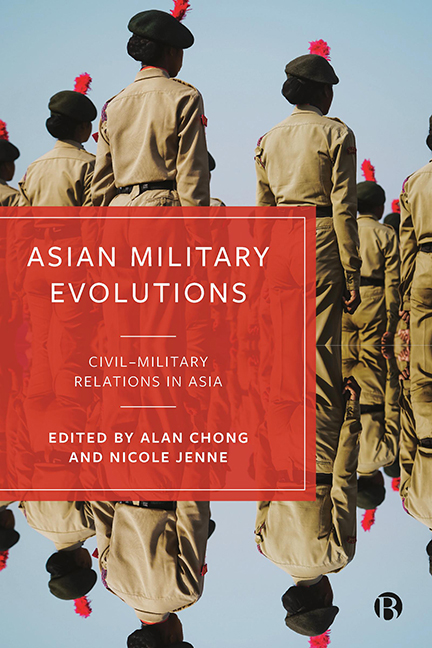Book contents
16 - Conclusion: Asian Military Evolutions as a Contribution to Civil–Military Relations Thought
Published online by Cambridge University Press: 18 January 2024
Summary
In closing this attempt to plumb an Asian contribution to civil–military relations, we will revisit the six research questions set out in Chapter 1. Before doing so, it is appropriate to preface the conclusion with a reflection upon a representative perspective from a grounded Asian approach to civil–military relations. The following excerpts come from Malaysia’s first ever Defence White Paper, published in 2020 (Ministry of Defence of Malaysia, 2020). We chose Malaysia because it has been a country very much neglected, or at best under-studied in the field of civil–military relations, as David Han pointed out in Chapter 6.
Concentric Deterrence, the principal pillar, involves primarily the role of the MAF (Malaysian Armed Forces) in protecting national interests, particularly defending the sovereignty and territorial integrity by dissuading all forms of external intrusion and conflicts. National defence is pursued along the concentric areas that cover land, maritime, air and cyber electromagnetic domains.
Comprehensive Defence involves the synergistic application of both whole-of-government and the whole-of-society approaches to defend the nation in line with the concept of HANRUH [an abbreviation of Pertahanan Menyeluruh in Malay, signifying ‘Total/Comprehensive Defence’]. The process encompasses a continuous effort to build internal cohesion, enhancing defence preparedness, improving interagency coordination, strengthening nation-building, as well as boosting economic capacity and other aspects of national resilience in a thorough and sustainable manner. The nation’s defence is also enhanced through KESBAN [an abbreviation of Keselamatan dan Pembangunan in Malay, meaning ‘Security and Development’] that emphasises on pursuing security and development simultaneously.
Credible Partnerships refers to bilateral or multilateral defence cooperation with external partners. These partnerships are credible from two angles. First, Malaysia’s credibility as a dependable partner is the foundation of our defence engagements with countries in the region and the wider world. Second, these engagements benefit Malaysia and our partners in terms of defence readiness, security needs and regional stability.
The Government is committed to implement all three pillars to achieve the National Defence Vision.
- Type
- Chapter
- Information
- Asian Military EvolutionsCivil-Military Relations in Asia, pp. 340 - 348Publisher: Bristol University PressPrint publication year: 2023



